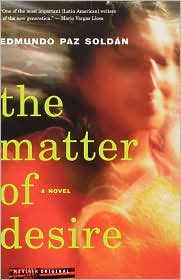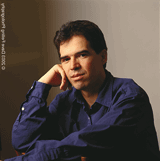“My weekly column was called “Vivir en el Sur” and it was about “the strangeness of living in [South America] after so many years in the North” (the mediocre libraries, the strikes, the smell of nicotine on clothes after a night out at a bar or club, the fact that I smoked or that I arrived late here, while everything was the opposite there). I wanted to be witty, but it was hard not to sound frivolous. It was obvious I was lost, distracted.”
Pedro Zabalaga, with a freshly minted PhD from Cal Berkeley, is a professor of Latin American Studies at the University of Madison (New York), a young man much in demand by American magazines as a commentator on the political situation in South America, and Bolivia, in particular. Pedro is the son of Bolivian hero Pedro Reissig, one of six men massacred by the army as their socialist cell was meeting to plan the overthrow of President Montenegro. Reissig died in the 1970s, when his son was still a small child, and the only legacy young Pedro has is a book his father has written entitled Berkeley. This he regards as “a long letter from Dad to me. By discovering the message he had hidden in the book, I would discover him…”
 Pedro Reissig, the father, had, like his son, studied for his PhD at Berkeley, where he became politically active, and where he also wrote a novel, still a cult favorite, filled with symbols. In order to find out more about his father and the myth that has grown up around him, young Pedro has returned to Rio Fugitivo in Bolivia, having been granted a one-semester research sabbatical by his university, and he is staying with his Uncle David Reissig, the only one of the seven people at the meeting to have survived the massacre. Now an alcoholic, David is a man who writes cryptograms and dreams of inventing a radio that will capture the voices of the dead. In his spare time he works at identifying the many symbols that fill Berkeley.
Pedro Reissig, the father, had, like his son, studied for his PhD at Berkeley, where he became politically active, and where he also wrote a novel, still a cult favorite, filled with symbols. In order to find out more about his father and the myth that has grown up around him, young Pedro has returned to Rio Fugitivo in Bolivia, having been granted a one-semester research sabbatical by his university, and he is staying with his Uncle David Reissig, the only one of the seven people at the meeting to have survived the massacre. Now an alcoholic, David is a man who writes cryptograms and dreams of inventing a radio that will capture the voices of the dead. In his spare time he works at identifying the many symbols that fill Berkeley.
The political use of the media is a theme which appears again and again throughout this novel. Not only is it one of Pedro Reissig’s themes in Berkeley, but it is also a concern of Pedro Zabalaga, his son, whose magazine articles about the political situation in Latin America are more accurately his visceral reactions to events and what he knows from his life there than they are a result of serious academic research. Magazines have quickly recognized that Pedro’s writing communicates differently from academic writing through its appeal to the reader’s emotions.
 Shortly after he returns to Rio Fugitivo, Pedro Zabalaga is asked to evaluate the memoirs of Jaime Villa, the drug kingpin of Bolivia, who is awaiting extradition to the United States, a man who was once his father’s close friend and who sees himself as a Robin Hood-like hero. Several of the revolutionaries Pedro Zabalaga befriends in Rio Fugitivo are also involved in the media, one of them working for a television station. A popular contemporary rock band, named “Berkeley,” conveys revolutionary messages through its videos. In one of the book’s cleverest ironies, the author of this novel himself employs the clues of Uncle David’s cryptograms as a way of conveying the history of the revolution to readers of this book.
Shortly after he returns to Rio Fugitivo, Pedro Zabalaga is asked to evaluate the memoirs of Jaime Villa, the drug kingpin of Bolivia, who is awaiting extradition to the United States, a man who was once his father’s close friend and who sees himself as a Robin Hood-like hero. Several of the revolutionaries Pedro Zabalaga befriends in Rio Fugitivo are also involved in the media, one of them working for a television station. A popular contemporary rock band, named “Berkeley,” conveys revolutionary messages through its videos. In one of the book’s cleverest ironies, the author of this novel himself employs the clues of Uncle David’s cryptograms as a way of conveying the history of the revolution to readers of this book.
The mystery of Pedro Reissig occupies much of the novel—Who is he? Who betrayed the group to the army? What does his novel Berkeley mean? What is the secret message? Who do the novel’s characters represent in real life? As the answers to these questions change with each of the main character’s new discoveries, the reader is kept in suspenseful anticipation. The ending is stunning.
Bolovian author Edmundo Paz Soldan is a fascinating “new” writer whose descriptions of people, their actions, and their politics are insightful and enlightening. His sensitivity to the contrasts between life in Bolivia and life in upstate New York is striking, and his ability to create not one, but two less than admirable “heroes” both of whom, nevertheless, keep the reader interested in their fates, is daunting. The tight construction, despite the constant changes in time and setting from Rio Fugitivo to Madison, NY, and Berkeley, along with the consistent thematic development, make this a novel which conveys a message without sacrificing the literary qualities which make novels and their characters come alive.
Notes: Also reviewed here: Paz Soldan’s TURING’S DELIRIUM and NORTE
The author’s photo appears on http://www.news.cornell.edu/stories/oct08/pazsoldan.gl.html
